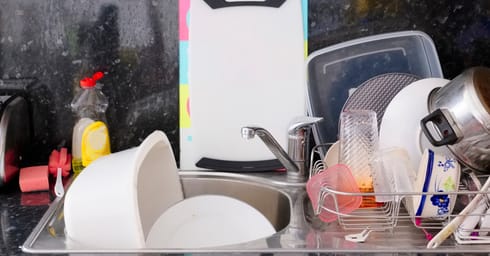
Motherhood as investment
My oldest son is getting married this summer and my second son just moved out. The family inside my home, the ones I feed and instruct are contracting, not expanding. At least, that’s the way it looks and feels when I plan dinners and school schedules.
Once, before our youngest was born, my husband reminded me that one of our children would have to be the youngest. One would not have the benefit of younger siblings bumping up against their wishes and plans. One would be the last man standing as the kids grow and leave. One would need to face the temptations of being spoiled by the attention of many older, capable siblings.
At this point, our youngest is ten. Our oldest will soon be twenty. Life looks very different now than it did when all five kids were ten and under.
I spent so many years trying to get my bearings, get a grip, figure out the routines, and make things run smoothly. I mothered with intensity. I did not keep house with intensity. I meditated on the word convivial and how to get out of my own head so I could build a home and life where we all enjoyed one another.
Convivial is not actually my natural bent. At heart I’m a logistics executive and what I think would really bless my efforts are minions who do what I say without question. As a young mom, I misinterpreted the ideal of obedience from my children as doing what I said without question.
It’s tricky, because there’s a sense in which that’s true, and in the sense that it’s true, my children were obedient. But in the sense that I imagined at the time, it is false. I imagined that the end of obedience would be me not having to say anything, and everyone would just do what I had laid out like clockwork. That never happened, so I kept trying to figure out the next system to try until we reached logistical nirvana.
The education and conversation and expectations I gave my children undermined my unconscious goal. I had expectations that the right system + obedient children would equal zero friction + high achievement. What that would take, however, is not obedient children, but automatons, more machine than human, cogs.
Yet I educated my children to take initiative, to think, to problem-solve for themselves, not to accept commands unthinkingly. And I was frustrated when their practice attempts were aimed at me. Instead of noticing that they were stretching their muscles toward proper independence and directing it with joy, I strategized over how to make my own life easier.
But an easy life isn’t the goal of our mothering. The goal of life isn’t to find or make the easy road. Sanctification for God’s glory is the goal, both for us and for our children, which makes it also the goal for our mothering.
We don’t mother for ourselves – certainly not for our own convenience, but also not for our own personal glory. Our children are not given us to be pets or trophies or accessories.
If our children were like pets, then our responsibilities would stop at keeping them alive. Our training efforts with them would be done simply for our own convenience, because we want our life to flow a certain way, feel a certain way.
If our children were like trophies, we’d consider how each of their choices reflected on us. We’d take credit for their good choices and try to minimize and hide their bad choices. We’d be very careful about appearances, because the point would be looking good to others via our children’s outfits, behavior, skills, and achievements.
If our children were like accessories, then we’d make decisions about how many to have and what to do with them based on our own personal aesthetic. What look are we going for? Which lifestyle option are we trying to click? Kids, in some combination and with a mix of other optional lifestyle picks, would help us achieve the life we want.
Because our children are not pets or trophies or accessories, having them, dressing them, raising them, educating them are not personal choices, but obedience choices made before God. We don’t mother in ways that please us or that seem right in our own eyes, but we mother before the face of God, answering to him for those immortal souls entrusted to our care.
As a young mom, my sights were set too narrowly. My vision was short-term. The smooth running of my own house was not the reason I was given children. The smooth running of my own house was only a part of my own sanctification and a gift I was supposed to give my children – not a gift they were to give me.
As an older mom now, my vision has expanded. Each of my children are not parts of our family puzzle, fitting together nicely. Each of my children are independent (in age-appropriate ways), productive, energetic contributors not to my household, but to God’s – and that’s exactly as it should be.
Every year now, the number of hands helping with chores decreases. Every year now, the number of hours they spend at home decreases. I, in fact, must decrease – but Christ increases. So I rejoice and look on, beaming with joy and approval even as “consistency” in family routines at home is nonexistent.
Routines are not the be-all-end-all goal. They are only tools to help us in the training years. They are personal tools to train ourselves by. The children break out of our routines by design, and it is a positive good for them that we should not hinder.
May we look forward to the day not that we have managed to keep our own little flock on track, but rather to the day when we look over at the other side of the church and see our children, grown, following the Lord in paths we didn’t set and that we don’t control.
May we all rejoice in the day when we sit at a meal reunited after a week or three apart from our grown children, and look around the table, and know deeply, “This is the Lord’s doing, and it is marvelous in our eyes.”
Mother now in light of that future, not in light of a hoped-for smooth-and-easy day with the children. Don’t fret and mourn as the children refuse to be children and practice their independence muscles. Rather, help them.
Mother birds shove the babies out of the nest so they must fly. We should be closer to that model than to emotional messes who want to selfishly freeze time and preserve our own sense of identity we’ve invested in.
The payoff of truly investing in our children is those children going out into the world and reaping an increasing dividend – on their own, not for us. If we resent that, then we discover we thought our investment was actually for ourselves.
What we reap for ourselves is our own sanctification in Christ alone – and mothering ourselves into an empty nest is just one more step in that process we must be willing to take – joyfully, convivially, humbly.






